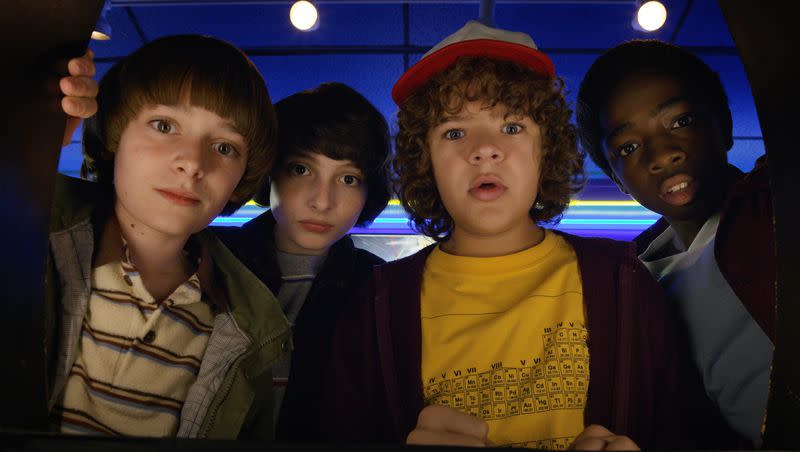What does the actors strike mean for you, the actors and Hollywood?

The Screen Actors Guild-American Federation of Television and Radio Artists went on strike on Thursday, according to The New York Times. As many as 160,000 performers are part of the union. They join the ongoing writers strike by the Writers Guild of America.
Both strikes mean many projects in Hollywood have come to a stop — the writers strike has already delayed productions. Shows like “Stranger Things,” “Abbott Elementary” and “The Last of Us” are among the shows impacted, per Today.
Actors who are part of the union were instructed in a memo regarding what they cannot do while the union is on strike. The memo is available publicly on SAG-AFTRA’s website.
Here’s a look into the strike rules and why the actors guild is striking.
Related
What does the actors strike mean?
Former Paramount CEO Barry Diller told CBS News that if the strikes aren’t resolved, there could be devastating consequences.
“You’re going to see subscriptions get pulled, which is going to reduce the revenue of all these movie companies, television companies. The result of which is that there will be no programs,” Diller said to CBS News. “... just the time the strike is settled, that you want to gear back up, there won’t be enough money. So this actually will have devastating effects if it is not settled soon.”
What are the actors strike rules?
Members of the union were instructed to not do work like acting, singing, voice acting, narration, stand-in work, fittings, make-up tests, rehearsals, interviews, auditions and other kinds of work either on- or off-camera, per the memo.
Promotional work including tours, fan expos, panels, premieres, junkets, awards shows, podcast appearances, social media, personal appearances and other forms of publicity are also not allowed during the strike. The memo instructs actors to not enter into an agreement “to perform covered services in the future” during the strike.
The memo includes a notice to nonmembers, which reads, “Any nonmember seeking future membership in SAG-AFTRA who performs covered services for a struck company during the strike will not be admitted into the membership in SAG-AFTRA.”
What does this all mean?
It means actors part of the union won’t be doing any acting work or publicity related to their acting work until after the union ceases the strike.
Why is SAG-AFTRA striking?
SAG-AFTRA is striking for higher pay, residual pay for streaming shows, protection from AI and improved conditions for virtual auditions, according to CNBC. The union went on strike after negotiations with big studios failed.
The union’s minimum pay for a non-background actor on a show with a budget higher than $2 million was $3,756 per week at the end of the last contract, CNBC reported.
“All American” and “Blackish” actress Kellee Stewart told CNN, “You have to pay taxes, plus commissions. For me, that would include an agent, a manager, and a lawyer that negotiates your deals. Right away, when you’re giving a quote for what you’re going to get paid, you already know that’s really going to be 35% less, give or take.”
While A-list actors and actresses like Reese Witherspoon, Tyler Perry and Dwayne Johnson take home millions of dollars, per Forbes, they also earn money from other business pursuits and not all performers make that much money.
The union’s minimum annual requirement to qualify for health insurance is $26,470, per CNN. “The Chosen” actor and SAG-AFTRA board member Shaan Sharma said only 12.7% of SAG-AFTRA members qualify for health insurance.
Sharma told BBC News that streaming platforms have impacted the way actors and actresses are paid. He said, “The pay scales that we get for broadcast television and cable are much greater than the streaming platforms pay. We’re not getting the same paycheck for the same amount of work simply because people are consuming online versus on traditional television.”
SAG-AFTRA and the Alliance of Motion Picture and Television Producers, which represents studios and streaming platforms like Universal Pictures and Hulu, were in talks before the strike began to try to reach a deal. The two groups didn’t reach a deal.
In a statement, Fran Drescher, president of SAG-AFTRA, said, “Despite our team’s dedication to advocating on your behalf, the AMPTP has refused to acknowledge that enormous shifts in the industry and economy have had a detrimental impact on those who perform labor for the studios.”
AMPTP said in a statement to CNBC, “We are deeply disappointed that SAG-AFTRA has decided to walk away from negotiations. This is the Union’s choice, not ours. In doing so, it has dismissed our offer of historic pay and residual increases, substantially higher caps on pension and health contributions, audition protections, shortened series option periods, a groundbreaking AI proposal that protects actors’ digital likenesses, and more.”

